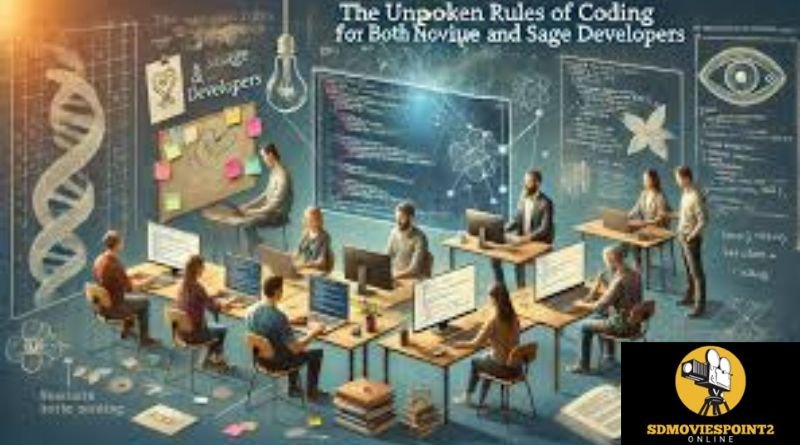Coding is an intricate craft that requires both creativity and technical skills. As developers progress from novices to sages, they encounter various challenges that shape their coding journey. While programming languages, frameworks, and technologies evolve, certain unspoken rules remain constant across different levels of expertise. This article delves into these essential guidelines, ensuring both novice and experienced developers can navigate the complexities of coding with confidence and clarity.
Understanding the Importance of Code Quality
One of the primary unspoken rules of coding is the paramount importance of code quality. Quality code is not merely functional but also readable, maintainable, and efficient. Novice developers often focus on getting their code to work, sometimes at the expense of its quality. They may write code that functions correctly but is difficult for others (or even themselves at a later date) to understand.
For instance, using descriptive variable names is a practice that e nuances readability. Instead of naming a variable x or data, a more descriptive name such as user Age or order Total provides context. This not only aids the original developer in understanding their work when revisiting it but also assists other developers who may collaborate on the same project. Sage developers inherently understand this principle and often take the extra time to ensure that their code adheres to these quality standards.
Embracing Version Control Systems
Another essential rule that transcends experience levels is the necessity of using version control systems, such as Git. This practice is critical for both novice and sage developers, as it provides a structured method for tracking changes, collaborating with others, and reverting to previous versions of the code when necessary.
Novice developers may find the command line interface of Git intimidating at first, but understanding its basic commands can significantly enhance their coding efficiency. By learning to create branches, commit changes, and merge code, novices lay the groundwork for a more organized and less error-prone coding experience. Sage developers, on the other hand, leverage advanced version control features, such as rebasing and cherry-picking, to manage complex projects and workflows. Embracing version control early in one’s career can foster good habits that pay off throughout a developer’s journey.
Documentation: The Unsung Hero of Coding
Documentation is another unspoken rule that often goes overlooked by novice developers. While writing code, it can be easy to neglect the importance of documenting the logic and decisions behind the code. However, proper documentation serves as a guide for both current and future developers.
For novices, documentation can clarify their thought processes and reasoning behind certain implementations, which is particularly helpful when revisiting code after a time gap. Sage developers understand that documentation is not merely an afterthought but an integral part of the coding process. They often maintain clear and concise documentation throughout their projects, making it easier for teams to understand complex systems and functionalities. Effective documentation includes code comments, README files, and external documents that outline the architecture and design decisions, thus enhancing collaboration and knowledge sharing.
The Significance of Testing
Testing is a critical aspect of the coding process that both novice and sage developers must prioritize. While novices may feel that testing is a step that can be overlooked if the code seems to work, sage developers understand that thorough testing is essential for creating robust applications.
Unit testing, integration testing, and end-to-end testing are all components of a comprehensive testing strategy. Novices can start with unit tests, which are focused on individual components, helping them understand how to identify and resolve bugs early in the development process. Sage developers often employ automated testing frameworks to streamline this process, ensuring that new code does not introduce unforeseen errors into existing systems. A strong testing culture fosters a proactive approach to error management and significantly reduces technical debt over time.
Continuous Learning and Adaptation
In the ever-evolving landscape of technology, continuous learning is a critical unspoken rule for all developers. Novice developers should embrace a mindset of curiosity and openness to new ideas and technologies. Whether it’s attending workshops, taking online courses, or reading industry blogs, staying updated with the latest trends and tools can enhance their skills and employability.
Sage developers, too, understand the importance of lifelong learning. They often share their knowledge with novices, whether through mentorship, code reviews, or community engagement. This reciprocal learning environment not only strengthens the skill sets of all developers involved but also fosters a collaborative culture where knowledge sharing is valued. In addition, engaging with the developer community through forums or open-source projects can provide valuable insights and experiences that enrich a developer’s understanding of coding practices.
Balancing Speed and Quality
A common pitfall for novice developers is the pressure to produce code quickly. This rush can lead to sloppy coding practices and overlooked errors. However, sage developers recognize that while speed is essential, it should never come at the expense of quality.
The ability to balance speed with quality requires discipline and foresight. Developers should adopt practices such as code reviews and pair programming to enhance their output while ensuring quality remains intact. By engaging with peers, novice developers can learn to prioritize tasks, plan their work effectively, and ultimately improve their coding proficiency. Sage developers often encourage this practice, understanding that collaborative efforts lead to better solutions and help foster a supportive coding environment.
The Role of Community and Collaboration
The coding community plays a vital role in the growth of both novice and sage developers. Engaging with peers, participating in coding boot camps, or contributing to open-source projects can provide invaluable support and insights.
Novice developers benefit immensely from community support as it provides a safety net for learning. Platforms like Stack Overflow and GitHub allow them to ask questions, seek help, and learn from the experiences of others. Sage developers, having amassed a wealth of knowledge, often give back to the community by sharing their experiences, providing mentorship, and contributing to open-source projects. This sense of community not only strengthens individual skills but also fosters a culture of collaboration and shared growth in the development field.
Building a Strong Foundation with Best Practices
Establishing a solid foundation based on best practices is crucial for all developers. Novice developers should familiarize themselves with coding standards and best practices relevant to their programming languages and frameworks.
For instance, understanding design patterns can significantly enhance the organization and efficiency of code. Sage developers often leverage these patterns to create scalable and maintainable solutions. Adopting best practices from the beginning of one’s coding journey can lead to more efficient problem-solving and improved coding skills over time.
Conclusion: Embracing the Journey of Coding
The journey of coding is one of continuous growth and adaptation. Both novice and sage developers encounter various challenges, and by adhering to the unspoken rules of coding, they can navigate these challenges more effectively.
From prioritizing code quality to embracing continuous learning, the guidelines discussed here serve as foundational principles for successful coding practices. Ultimately, fostering a collaborative environment where knowledge sharing is encouraged can lead to a more enriching experience for all developers, regardless of their expertise. By embodying these principles, developers can contribute to a more innovative and supportive coding community, paving the way for future generations of coders.
The unspoken rules of coding for both novice and sage developers are not merely suggestions but essential practices that can enhance their coding journey. By adopting these principles, developers can ensure they build not only functional code but also maintainable and robust software solutions that stand the test of time.
Read also: check




